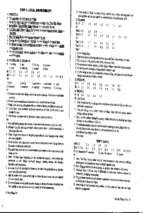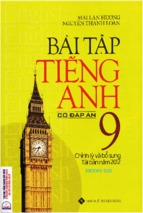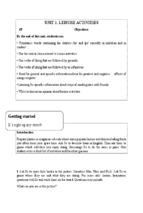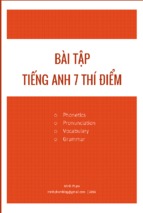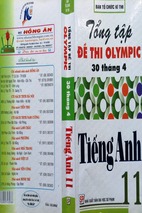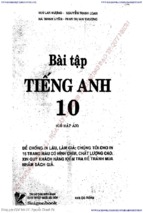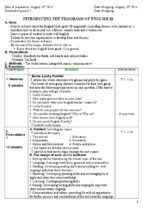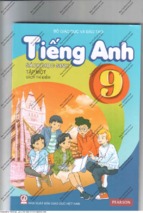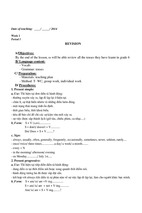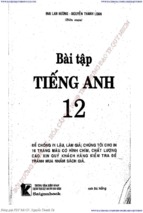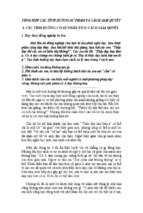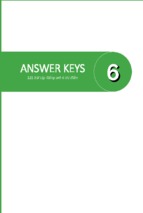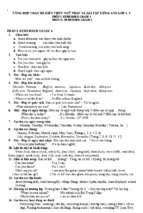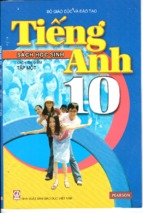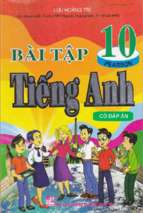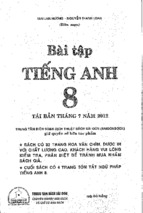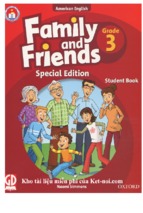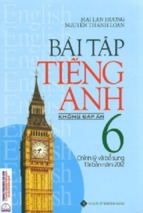Tài Liệu Bồi Dưỡng Học Sinh Giỏi Lớp 7
Period 1+2 . TENSES
I. Summary (Tóm tắt):
Tenses
Affirmation
Negation (PĐ)
Interrogation
(KĐ)
(NV)
S + V(s-es)
S + don’t/ doesn’t Do/Does
+
(be): am- is- are +V1
S+V1?
Present
S+ am not/ isn’t/
Am/Is/Are + S+
simple
aren’t
…?
With
Everyday,
usually, after
school, never,
often,
sometimes,
always, ...
Now, at the
Present
S + am/is/are + V- S+am/is/are(not) Am/ Is/Are +S+V- present, at the
progressiv
ing
+V-ing
ing?
moment, at this
e
time, Look!
II. The differences between present simple and present progressive:
Present simple
Present progressive
1. Hành động có tính bền vững, luôn
1. Hành động có tính tạm thời, không thường
luôn đúng theo thói quen, phong tục và xuyên:
khả năng:
(today, this week, this year...)
- I work in New York.
- I’m working in New York for a few weeks.
2. Nhận thức, tình cảm, tình trạng xảy
ra lúc đang nói:
I know you are busy now.
3. Thời khoá biểu, lịch trình các
chương trình:
The train for Hanoi leaves at 7.30
tonight.
2. Không dùng thì này với các hoạt động
nhận thức, tình cảm, tình trạng, sở hữu, tồn
tại: see, think, believe, feel, look smell, taste,
hear, expect, assume
3. Kế hoạch, sự sắp xếp cho tương lai gần:
- She is arriving at 11 o’clock.
4. Dùng kèm với ALWAYS diễn tả sự phàn
4. Chân lý hiển nhiên:
nàn:
- It rains a lot in HCM City.
He is always coming to class late.
III. Give the correct form of these verbs: (Present simple and present
progressive)
1.The sun (set) …………in the West. The earth (circle) ……………
the Sun once every 365 days.
2. It usually (rain) ……………in the summer. Rivers usually (flow)
………………to the sea.
3.They (often build) ………………… hotels, but this year they
(build) ……………… hospitals.
4.Bees (make) …………………………honey.
5.They (get) …………………………on the scale now.
6. Don’t worry. I (give) ……………………him your message when I
(see) ……………………… him.
7. Look! Jane (play) ..................... the guitar. this afternoon she (play)
…………………… table tennis.
8. I (not talk) …………………………to her at present.
9. How
often…………………………she
(go)
…………………………fishing?
- She (go) …………………………once a year.
10. .............. your friends (be)…………………… students? - Yes,
they (be) ..........................
11. ................ the children (play…………………………in the park
at the moment?
- No, they aren’t. They (learn) ..................................... to play the
piano.
12. ………….you (go)………………………….. to school on
Sundays? – Yes, I do.
13. My mother (cook) ………………………a meal now. She ( cook)
………………………everyday.
14. What…………your mother (do)……………. at this time? - She
(make) ………………a dress.
15. ............. she often (go)……………………… to the cinema every
weekend?
- I don’t know. But she always (go) ......................... to the church
on Sundays.
16. Hurry up! The bus (come) …………………………… .
19. The students (not be) …………………………in class at present.
20. She always (wash) …………………………the dishes after
meals.
21. What____________ your father usually ____________ (do) in
the evenings ?
22. He usually ____________ (watch)TV. He (not talk)
____________ to her at present.
23. He____________ (be) out at the moment but he____________
(be) back at about seven o’clock.
24. I can ____________ (see) the children. They____________
(play) in the yard.
Period 3. TENSES
I. Summary (Tóm tắt):
Tenses
Affirmation
Negation (PĐ)
(KĐ)
Intende S + am/
is/ are S + am/ is/ are+
d
+ going to
not + going to
Future
S+ will + V1
S+ will not + V1
Simple
Interrogation (NV)
Am/ Is/ Are + S+
going to +V1 ?
Will + S + V1?
With
II. The differences between intended future and future simple:
Intended future
Future simple
1. Ý định đã được dự trù, sắp xếp trước 1. Ý định ngay khi nói hay hành động sẽ xảy
khi nói:
ra ở tương lai không phụ thuộc vào ý định:
- Iam going to visit New York this
- He will come here tomorrow.
summer.
2. Ý kiến, lời hứa, hy vọng, phát biểu về
một hành động trong tương lai: (think,
2. Sự suy đoán chắc chắn dựa vào căn
promise, hope, expect..)
cứ hiện tại:
- Wait here and I will get you a drink.
- There are a lot of clouds. I think it is
- I think you will pass the exam.
going to rain.
III. Give the correct form of these verbs: (Intended future and Future
simple)
1. I think she (win) …………………………the gold medal.
2. They (build) …………………………a house by June next year.
3. Don’t worry. I (give) …………………………him your message
when I see him.
4. I (meet) …………………………Jane next week.
5. What…………your mother (do) …………………next week? She (make)…………………a dress.
6. The students (not go ) …………………………on a trip next week.
7. My mother is saving money because they ( buy)
……………………… a new house next year.
8. She is preparing her trip now. She (visit) …………………… her
friends tonight.
9. What …………you (do)………………….. this Sunday? - I
(visit) ......................... my grandparents.
10. I think Liz and her parents (go) ………………………to Tri
Nguyen Aquarium in Nha Trang.
IV. Present simple and Future simple trong mệnh đề điều kiện và
mệnh đề thời gian chỉ tương lai:
- Mệnh đề thời gian:
S +Will + V1+ When/ while/ after/ before/ as/until + S + V
(Present simple)
When/ while/ after/ before/ as/until + S + V (Present simple), S
+Will + V1
When he comes tomorrow, we will welcome
him.
- Mệnh đề điều kiện:
S +Will + V1+ if + S + V (Present simple)
If + S + V (Present simple),S +Will + V1
If she visits me next week, we will have dinner
together.
V. Give the correct form of these verbs:
1. We’ll go out when the rain (stop) ………………………….
2. Miss Helen (help) …………………… you if she (finish)
…………………… that letter tomorrow.
3. I (come) ……………………… and (see) ………………………
you before I leave here.
4. I (wait) ……………………… he if you (come)
……………………… back tomorrow.
5. I (send) …………………… you some postcards as soon as I
(arrive) …………………… in London.
6. I’ll wait until he (finish) ……………………… his novel.
7. I (give) ……………………… her your letter if I (see)
……………………… her tomorrow.
8. When you (go) ………………… into the office, Mr. John (sit)
…………………… at the front desk.
9. We (wait) ……………………… for you when you (get)
……………………… back tomorrow.
10. If you (come) ……………………… today, I (work)
……………………… at my desk in Room 12.
11. I (give) ……………………… her your letter when I (see)
……………………… her tomorrow.
12. As you (go) ………………… back home, your children (wait)
………………… at the front door.
Period 4 + 5. TEST 1
Question I: Underline the stressed syllables of these words:
Práctice, classmate, morning, student, answer, question, uncle,
different, unhappy, parent, everything, pretty, busy, listen, number,
beautiful, children, neighborhood, museum, hospital
Question II: Choose the word that has a different pronunciation
from the others of each group:
1. A. bread
B. coffee
C. meat
D. tea
2. A. bath B. bathe
C. great
D. stead
3. A. leave B. read
C. ready
D.
week
4. A. hungry
B. pupil
C. Sunday
D. up
5. A. but B. come
C. so
D. much
6. A. dirty
B. early
C. learn
D.
near
Question III: Put the verbs into correct tense or form:
1. Lan (not have) ______________ many new friends in her new
school.
2. hung (come) ______________ from Vinh, but he (stay)
______________ with his relatives now.
3. We (not drive) ______________ to work every day. We (go)
______________ by bus.
4. Who (talk0 ______________ on the phone, Nam.
5. They (often build) ______________ hotels, but this year they (build)
______________ hospitals.
6. Hurry up! The bus (come) ______________.
7. My mother is saving money because they (buy) ______________ a
new house next year.
8. We’ll go out when the rain (stop) ______________
Question IV: Correct the following sentences:
1.How old Hoa will be on her next birthday?
2.Would you like seeing a good movie tonight with
me?
3.Nhung’s birthday is in the third day next Friday.
4.Today is Thursday, the two ninth of March.
1.
.............................
.....
2.
.............................
....
3.
.............................
.....
5.I don’t will have a party next November.
6.Hong doesn’t has a lot of friends in her new
school.
7.What’s are your telephone number, Phuong?
8.Mai will goes to Hai Phong tomorrow.
9.Who are you and your friends talk about?
10. Linh lives with her uncle in 37 Nguyen Trai
Street.
4.
.....
5.
.....
6.
.....
7.
.....
8.
.....
9.
.....
10.
.....
.............................
.............................
.............................
.............................
.............................
.............................
.............................
Question V: Fill in the blank with one suitable word:
come / start / teach /have / meet / not work / finish / not like / fly
/ travel / camp / love / like
Bruce Charles is an English teacher at a language school in
Brighton- students (1) ......................from all over the world to study
there. He (2).......................... grammar and reading. He usually
(3)......................... work at 9.00 and (4).......................... at 3.30. He
(5).......................... his job because he (6).......................... lots of
people from many countries. But he (7).......................... at the moment.
He (8).......................... round Peru with his friends. They are spending
five days walking in the Andes. They (9).......................... in beautiful
places every night but Bruce (10).......................... a problem. he
(11).......................... walking, but he (12).......................... sleeping in a
tent .They (13).......................... back to England next week.
Question VI. Circle the best option (A, B, C or D) to complete the
sentences.
1. In the future, machines _______ all the work for us.
A. are doing
B. will do
C. were doing
D. do
2. Every day Mr. Tuan _______ in the fields from 6 am to 4 pm.
A. worked
B. work
C. is working
D. works
3. When _______ Vietnamese people celebrate the New Year?
A. will
B. are
C. do
D. is
4. Ba is in his room. He _______ the guitar now.
A. was playing
B. played
C. is playing
D. will play
5. Next month is Lien’s birthday. She _______ some of her friends to
her birthday party.
A. invite
B. invites
C. is going to invite
D.
invited
6. John Robinson is an English teacher. He _______ for an apartment
in Ha Noi for his family now.
A. looks
B. is looking
C. looked
D.
will look
7. “………………………….. this week?” “No, she’s on holiday.”
A. Is Susan working B. Does Susan work C. Does work Susan
D. Has Susan worked
8. I’m ……………………….. with the result.
A. please
B. pleasing
C. pleasant
D.
pleased
9. . ……………………………… I carry that bag for you? Thanks.
A. Do
B. Shall
C. Will
D.
Would
10. Our new car is smaller, so it uses……………………….. petrol.
A. more
B. fewer
C. less
D.
little
11. My birthday is …………………………………….. February 2nd.
A. in
B. on
C. at
D. since
12. A. It isn’t enough funny for him to repeat.
B. It isn’t funny
enough for him repeating.
C.It isn’t funny enough to him to repeat.
D. It isn’t funny
enough for him to repeat.
Question VII. Insert the correct form of the words in brackets: (2
ms)
Ex: My mother is a______________ of English.
(teach)
My mother is a teacher of English.
1. She enjoyed the ……………………………. atmosphere.
(peace)
2. Hoa is the most……………………….………. girl in her class.
(beauty)
3. Hanoi people were ………………………………………. (friend)
4. Today the weather is fine and ………..……………….(sun)
5. He is a famous…………………….
(act)
6. He ....................... for his wrongdoings.
(apology)
7. He plays soccer …………..............……….………(beauty)
8. This is the biggest……………..in the city. (build)
9. Bill Gates is a famous ..........................(busy)
10. Hoa has a fine …………..............……….……… of stamp.
(collect)
Question VIII. Rewrite the sentences in a way that is has similar
meaning to the original sentences:
1.
My kitchen is smaller than yours.
Your kitchen…………….…......................................................
2.
The children liked to walk in the rain.
The children enjoyed
………………..............................................……………
3.
My grandmother is very old. She can’t work now.
My grandmother is too ……….............................................
……………
4.
The children couldn’t go swimming because the sea was rough.
The sea was so…………………...........................................
……………
5.
Hung is taller than Ba.
Ba…………………...................................
………………………….
6.
We learned this after a long time.
It took……………………….....................…
7.
Peter is too young to see the horror film.
Peter is not…………........................
……………………………...
8.
What’s your date of birth?
When…………………………………………………………………
…………?
Question V. Write a letter to your friend inviting him/her to take part in your birthday
party. You can use the following suggestions.
- Date of
the
party:
Sunday,
May the
Dear.........………,
…………........................
………………………………………………………
…………........................
………………………………………………………
fifth
- Place
of the
party:
80/
1Hamlet
, La
Vang
- Time of
the
party:
7 PM to
8 PM
Activitie
s at the
party:
Games,
songs,
dance
- Food
and
drinks:
Cakes,
sweets,
Pepsi
…………........................
………………………………………………………
…………........................
………………………………………………………
…………........................
………………………………………………………
…………........................
………………………………………………………
…………........................
………………………………………………………
…………........................
……………………………………………………….
…………........................
………………………………………………………
Love,
Period 6+7. WORD FORMATIONS
I. THAØNH LAÄP DANH TÖØ CHÆ NGÖÔØI
Ver
Teach/Teacher (giáo
Drive/driver (tài xế)
viên)
Write/ writer (tác giả)
Sing/ singer (ca sỹ)
Play/ player (cầu thủ)
Farm/ farmer (nông dân)
V- or Visit/ visitor: du khách
N- or Direct/ director: giám
đốc
Act/ actor: nam diẽn
Lend/ lender (người cho
mượn)
Work/ worker(công
nhân)
Employ/employer (ngườ
chủ)
Edit/ editor: biên tập viên Compete/ competitor:
Debt /debtor: con nợ
đấu thủ
Instruct/ instructor:
người hướng dẫn
Vist
viên
Novel/ novelist: tiểu
thuyết gia
Art/ artist: hoạ sỹ
Tour/ tourist: du khách
Type/ typist: người đánh
máy
Science/ scientist: nhà
khoa học
Social / socialist: Đảng
viên
Enjoy/ enjoyment: sự
thích thú
Equip/ equipment: thiết
bị
Illustrate/ illustration:
minh hoạ
Instruct/ instruction:
hướng dẫn
Manage/management:sự
quản lí
Move/ movement; sự di
chuyển
Compete/ competition:
ctranh
Prevent/ prevention:
ngăn cản
II. THAØNH LAÄP DANH TÖØ
Agree/ agreement: sự
đồng ý
Vment Encourage/
encouragement
VParticipate/
tion
participation: thgia
Destroy /destruction:
(Sự ... phá huỷ
)
VDetermine/
ation determination:
(Sự ... quyết định
)
Concentrate/
concentration
tập trung
Form
/
form
ation
:
thành
lập
Com
bine/
comb
inati
on:kế
t hợp
Vness
(Sự ...
)
Clean/ Cleanness: Sự
sạch sẽ
Clear/ clearness: sự rõ
ràng
Deaf/ deafness: tật điếc
Weak/ weakness: yếu
điểm
Kind/ kindness: lòng tốt
Lazy/ laziness: sự lười
biếng
Sad/ sadness: nỗi buồn
Ready/ readiness: sự sẳn
sàng
ADJth
Dark/ darkness: bóng tối
Great/ greatness: sự to
lớn
Happy/ happiness: Hạnh
phúc
Willing/willingness:sự
sẳn lòng
True/ truth: sự thật
Strong/ strength: sức
Long/ length; độ dài
mạnh
Wide/ width: chiều rộng
Grow/ growth: sự phát
triển
Deep/ depth: độ sâu
III. THAØNH LAÄP TÍNH TÖØ
Sun/ sunny: nắng
N- y Rain/ rainy: mưa
(có ...) Sand/ sandy: cát
N- ly
(có vẻ,
hàng)
N-ful/
less
Day/ daily: hàng ng ày
Week / weekly: hàng
tuần Month; yearly:
hàng thág /năm
Careful / Careless:
Helpful / helpless
Success/ Successful:
thcông
N- ful Delight/ delightful: thú
(đầy) vị
Power/ powerful: hùng
mạnh
NCloudless: không mây
less
Childless: khônng có
(không) con
N – al Nature/ natural: thiên
(thuộc) nhiên
Industry/ industrial;
Cloud/ cloudy: mây
Wind/ windy : gió
Snow/ snowy: tuyết
Love/ lovely: đáng yêu
Leisure/ leisurely: thoải
mái
Friend/ friendly: thân
thiện
Man/ Manly: có vẻ đàn
ông
Brother/ brotherly: tình
anh em
World/ worldly: thế gian
Harmful / harmless
Hopeful / hopeless
Peace/ peaceful: thanh
bình
Beauty/ beautiful: đẹp
Pain / painful: đau đớn
Speechless: không nói
được
Treeless: trụi cây cối
Economy/economical:
tiết kiệm
History/ historical: lịch
Dust/ dusty: bụi
Fog/ foggy: sương mù
Health/ healthy: khoẻ
mạnh
Thoughtful / thoughtless
Colorful / colorless
Wonder/ wonderful:
tuyệt
Truth/ truthful: chân
thật
Waste/ wasteful: hoang
phí
Restless: không nghỉ
ngơi
Odorless: không mùi
cônghiệp
sử
Environment/
environmental
Music/ musical: âm nhạc
IV. THAØNH LAÄP ÑOÄNG TÖØ:
N–
ize
ADJ-
en
N–
en
EN-
Symbol/ symbolize:
tượng trưg
Apology/ apologize: xin
lỗi
Weak/ weaken: làm cho
yếu
Dark/ darken: bôi đen
Strength/ strengthen: tăg
cường
Rich/ enrich: làm giàu
Large/ enlarge: mở rộng
Emphasis/ emphasize:
nhấn mạnh
Critic/ criticize: phê bình
Drama/ dramatize:
đóng kịch
Sharp/ sharpen: mài sắc,
vót nhọn
Wide/ widen: mở rộng
Length/ lengthen: kéo dài
Weak/ Weaken: làm
yếu đi
Sure / ensure: bảo đảm
Close/ enclose: gởi k èm
Danger/ endanger: gây
nguy
Courage/ encourage:
kh.khích
N–
fy
Beauty/ beautify: làm
đẹp
Satisfaction/ satisfy: thoả
mãn
Solid/ solidify: làm ch
chắc
Hurried/ hurriedly: vội
Excited/ excitedly: hào
hứng
Surprising /
surprisingly
Slow/slowly: chậm
V. THAØNH LAÄP TRAÏNG TÖØ
ADJly
(1
cách)
Quick/ quickly: nhanh
Beautiful/ beautifully:
hay, gi ỏi
WORD FORM CHART
1.
NOUN
VERB
ADJ
PARTICIP
ADV
NOTE
LE
2. Anger
3. Anxiety
4. Act/ action/
activity
Act
5. Amusement
Active
Actively
Amuse
6. Attraction
7. Beauty
Attract
Beautify
Amusing/e
d
Attracted
Angry
Anxious
Attractive
Beautiful
Angrily
Anxiously
Hoaït ñoäng
Giaän
Lo laéng
Vui chô
Attractively
Beautifully
Haáp daã
Ñeïp
8. Business
9. Care/ ful/
ness
10. celebration
Care
Busy
Careful/ less
celebrate
celebrative
11. Center
12. Collection
13. Comfort
Collect
Comfort
14. Communicat
ion
Communica
te
15. Curiosity
Endanger
16. Danger
Dangerous
17. Death
Die
Deafen
18. Deafness
Deepen
19. Depth (ñoä
(laøm)
saâu)
20. Dependence Depend
Busily
Careful/
lessly
Central
Toå chöùc lễ
Centrally
Collective
Comfortable
Comfortably
Communicati
ve
Curious
Dead
Deaf
Deep
Curiously
Dangerousl Nguy hieåm
y
Deeply
Baän vie
Caån tha
Trung
taâm
Thu tha
Tieän
nghi
Thoâng
tin
Toø moø
Cheat
Ñieác
Saâu
Phuï
thuoäc
Differ
Different
Differently
21. Difference
Khaùc
nhau
Difficult
Difficultly
22. Difficulty
Khoù
khaên
23. Disappointm Disappoint Disappointin Disappointed/ Disappointed Thaát
ing
ent
g
ly
voïng
Economical Economic/ al
Economicall Kinh te
24. Economy
ize
y
Electrical
Ñieän
25. Electricity
exciting
Excited/
Excitingly
26. Excitement Excite
Haøo
ing
höùng
Explanatory
27. Explanation Explain
Giaûi
thích
Dependent
28. Fascination
Fascinate
29. Friend/ ship
30. Fluency
31. Harm
Fascinating
Friendly
Harm (gaây
Fascinating/ Fascinatingly Loâi cuo
ed
Baïn beø
Fluent
Fluently
Harmful/ less
Troâi
chaûy
Haïi
32. Happiness
Happy
Harmlully/le
ssly
Happily
33. Health
Healthy
Healthily
Maïnh
khoeû
34. History
35. Information
Historically
Inform
Historic/ al
Informative
36. Invention
Invent
Inventory
Lòch söû
Thoâng
tin
Phaùt
minh
Löôøi
bieáng
Daøi
Di
chuyeån
haïi)
37. Laziness
38. Length
39. Movement
Lazy
Lengthen
Move
Long
Movable
(coù theå di
chuyeån)
40. Nation/ ality Nationalize
National
41.
42.
43.
44.
45.
Naturalize
Please
Pollute
Possess
Practise
Natural
Pleasant
46. Preparation
47. Prevention
Prepare
Prevent
Preparatory
Preventable
48. Product
Produce
Productive
Nature
Pleasure
Pollution
Possession
Practice
Lazily
Moving/ ed
(xuùc ñoäng)
Nöôùc/
qtòch
Naturally
Pleasantly
Polluted
Possessive
Practical
Haïnh
phuùc
Possessively
Practically
Töï nhie
Vui veû
OÂ nhieãm
Sôû höõu
Thöïc
haønh
Chuaån b
Ngaên
caûn
Saûn
Product/ tion
49. Protection
50. Reason
51. Science
Protect
Reason
Protective
Reasonable
Scientific
52. Society
53. Strength
54. Success
Socialize
Strengthen
Succeed
Social/ ist
Strong
Successful
55. Variety
56. Value
57. Violence
Vary
Value
Violate
xuaát, sa
phaåm
Baûo veä
Reasonably
Lyù do
Scientifically Khoa
hoïc
Socially
Xaõ hoäi
Strongly
Maïnh
Successfully Thaønh
coâng
Various
Valuable
Violent
Variously
violently
Ña daïng
Giaù trò
Baïo
ñoäng
AÁm aùp
Roäng
Kì dieäu
Warn
Warm
Warmly
58. Warmth
Widen
Wide
Widely
59. Width
Wonder
Wonderful
Wonderfully
60. Wonder
Complete the sentences using the correct form of the words in
brackets.
1. He is a famous…………………….
(Act)
2. He ....................... for his wrongdoings.
(Apology)
3. He plays soccer …………..............……….………
(Beauty)
4. This is the biggest……………..in the city.
(Build)
5. Bill Gates is a famous ..........................
(Busy)
6. Hoa has a fine …………..............……….……… of stamp.
(Collect)
7. You must ................................. the answer you choose.
(Dark)
8. She welcomes us…………..............……….………
(Deep)
9. There is no …………..............……….……… between my
(Differ)
answer and his.
10. We have a lot of …………..............……….……… in
(Difficult)
learning English.
11. Nam is very…………..............……….……… and heavy.
(Economically)
12. I felt very …………..............……… when I was a member of (Excite)
our school team.
13. The is an…………..............……….……… football match
(Excite)
this afternoon.
14.
15.
16.
17.
18.
19.
20.
Her smile is very ............................
He speaks English .....................................
We are very proud of our………..............……….
He turns out to be the………..student in his class.
He leads his life ...................
If you smoke, it is …………..............……….……… to you.
He does exercise every morning, so he is
very…………..............……….………
21. Smoking is bad for your...............................
22. Her parents’ …………..............……….……… makes her
very sad.
23. News on TV is very ......................
24. He gets bad grades because of his...................
25. What is his ............................?
26. Every man loves ................................ beauty.
27. She had a lot of ............................ for Tet.
28. He run very..............……….………
29. It is cloudy and .......................... toay.
30. We are interested in .......................... books.
31. Ha Long Bay is one of the ........................... of the world.
32. This…………has written many stories for children.
33. Water is .......................................
34. A large number of .............................. comes to Nha Trang
every year.
Period 8. ADVERB CLAUSES OF RESULT AND
PURPOSE
A. ADVERB CLAUSES OF RESULTS
Là mệnh đề trạng ngữ chỉ kết quả bắt đầu các liên từ: so (vì vậy),
so ... that (quá ... đến nỗi)
S +V+ SO + S + V
He works hard, so he earns a lot of money.
Cậu ấy làm việc chăm vì vậy cậu ấy kiếm nhiều tiền.
S +V+ SO + ADJ/ ADV THAT + S + V
He is so sleepy that he cannot watch T.V.
Cậu ấy quá buồn ngủ đến nỗi cậu ấy không thể xem T.V.
B. Join two sentences into one using “so, so ... that”:
1. Lan and Ba don’t have a tent. They never go camping
(Fascinate)
(Fluency)
(Friend)
(Good)
(Happy)
(Harm)
(Health)
(Healthily)
(Ill)
(Inform)
(Lazily)
(Nation)
(Nature)
(Prepare)
(Quick)
(Rain)
(Read)
(Wonderfully)
(Write)
(Color)
(Visit)
..............................................................................................................
.............
2. I have to stay at home. I can finish all my exercises.
..............................................................................................................
...........
3. Tan is very slow. He is late for school.
..............................................................................................................
..............
4. The weather is fine. We have a picnic on the mountain.
..............................................................................................................
......................
5. I don’t have a bike. I walk.
..............................................................................................................
..........
6. Nhan is tired. He can’t fly his kites.
..............................................................................................................
...................
7. The book is very interesting. I read it twice.
..............................................................................................................
.........................
8. Jane looks sick. The nurse tells her to go back home to rest.
..............................................................................................................
.........
9. The lesson is very difficult. No one can understand it.
..............................................................................................................
.......................
10.
The work is very hard. I can’t finish it on time.
..............................................................................................................
................
C. ADVERB CLAUSES OF PURPOSE:
Là mệnh đề trạng ngữ chỉ mục đích bắt đầu các liên từ: so that, in
order that (để mà)
S +V+ SO THAT + S + (can/ could/will/ would/ may/
might) + V1
He works hard so that he can have enough money to buy a new
house.
Cậu ấy làm vi ệc chăm để có thể có đủ tiền mua nhà mới.
D. Join two sentences into one, use SO THAT/ IN ORDER THAT:
1. The boy stands on the benches. He wants to see the view better.
→The boy stands on the benches so that he can see the view
better.
2. I’ll write to you. I want you to know my decision.
..............................................................................................................
..............
3. The man speaks loudly. He wants every one to hear him clearly.
.............................................................................................................
..............
4. You should walk slowly. Your sister can follow you.
..............................................................................................................
...........................
5. John gets up early. he doesn’t want to be late for the class.
..............................................................................................................
...........................
6. I wish to have enough money. I want to buy a new house.
..............................................................................................................
...........................
7. She needs a job. She wants to support her old parents.
..............................................................................................................
...........................
8. She puts on her warm clothes. She doesn’t want to catch cold.
..............................................................................................................
...........................
9. It was so dark. I couldn’t see anything.
..............................................................................................................
...........................
Period 9 + 10. TEST 2
Question I: Underline the stressed syllables of these words:
personal, information, telephone, directory, July, August, September,
October, November ,December,
tomorrow, evening, seven, theater, sorry, about, again, after, party,
remember, classroom, eraser, teacher
Question II: Choose the word that has a different pronunciation
from the other of each group:
1. A. lakes
A. fields
C. forests
D. deserts
2. A. stay
B. vacation
C. language
D. waste
3. A. photo
B. hotel
C. badminton
D.
homework
A. population B. bus
C. uncle
D. summer
Question III: Put the verbs into correct tense or form:
1. You (be) _____________ free next Saturday morning? – No, I
(visit) _____________ my grand mother.
2. Trang (not be) _____________ in her room at the moment. She
(cook) ______________ in the kitchen.
3. Would you like (have) ______________ breakfast with eggs.
4. Lien (not go ) ______________ to the movie theater tomorrow. She
(stay) ______________ at home.
5. The train for Hanoi (leave)______________ at 7.30 tonight.
6. I (know) ______________ you (be)______________ busy now.
Question IV: There is a redundant word in each sentence. Correct
the following sentences:
1. Good morning and welcome to our library. It’s the
0.
.......
most
most .......
largest library in the city. You can find all much
1.
............................
kinds of
......
2.
............................
books, magazines, and newspapers here. To finding
.....
each a book is
3.
............................
very easy. The only thing you can do is to by look in
......
4.
............................
the
......
card index. These cards show the subject and they
5.
............................
cards are
......
6.
............................
in alphabetical order by with both title and author.
......
And now
7.
............................
have a look at the shelves. These shelves are on the
......
8.
............................
right have there magazines, newspapers and
......
dictionaries.
9.
............................
Those shelves on the left library have science books
......
10. ............................
and
......
reference books. And those shelves at the come back
of the
library have lot history, geography, literature books.
4.
Question V: Read the passage and choose the best answer (A, B, or
C) to the following questions
My name is Hoa. Here is a photo of my school. It is a big school. It is
in Hue. It is on Nguyen Hue Street. In my school, there is a big yard
and there are a lot of trees around it. My school has three floors and
forty classrooms with 1,700 students. My classroom is on the second
floor. I’m in grade 7, class 7A. Our class starts at 7.00 and finishes at
11.30. At school we learn many things, but I like Literature and English
best. I also like Music, Sports and Art. We often have recess at 9.20.
We usually drink, eat and talk at recess. We sometimes play games like
blind man’s bluff or catch. We often make much noise at recess. After
school, we often go home and have lunch at 12.30.
1. Where is the school?
A. On Nguyen Hue Street
B. In Hue C. On Nguyen Hue
Street in Hue
2. How many students are there in the school?
A. 1,700
B. 1,070
C. 1,007
3. When does the class start and finish?
A. 7.00 and 11.00
B. 7.30 and 11.00
C. 7.00 and 11.30
4. What subjects does she like best?
A. Literature and English
B. Literature and Art C.
English and Music
5. What does she usually do at recess?
A. Drinks and eats
B. Drinks, eats and talks
C.
Eats and talks
Question VI. Tick () the best option (A, B, or C) to complete each of
the following sentences.
1. John likes ……………… tennis.
A. playing
B. play
C. played
D. to
play
2. ……………… Coffee without milk is yours?
A. The
B. An
C. A
D. Ø
3. Would you like to go ……………… the library?
A. to
B. on
C. at
D.
with
4. She will come ……………… her
A. when calling
B. We’re calling C. do we call
D. if we call
5. English books are on the shelves . . . . . . . the right.
A. on
B. at
C. in
D. Ø
6. We enjoy . . . . . . . . . in summer.
- Xem thêm -

